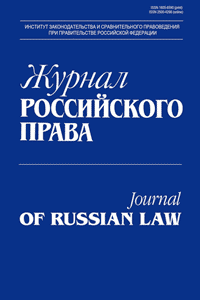The author studies the definitions and features of the concept of “beneficial ownership” and its application by Russian courts. Although the Russian civil law does not recognize the concept of beneficial ownership which comes from the English law of equity, this concept is beginning to be recognized by Russian judicial practice, in particular, in the recent resolutions of the Russian Supreme Court of the Russian Federation. The cases in question relate to the division of the joint property acquired by spouses during the marriage (the Russian courts consider the property (assets) of the offshore company or trust controlled by spouse (acting as a beneficiary) as a joint spouses’ property); recognition of the rights of beneficiary for challenging the decisions of the companies controlled by such beneficiary; levy of execution upon the property of the offshore companies and trusts controlled by beneficiary for the beneficiary’s debts. It is obvious that decisions of Russian courts are in the line with trends of development of foreign case law. One of the manifestations of the beneficial ownership concept in Russian law is the institute of “a person having factual right for the income”, fixed by Russian tax law. Considering the deoffshorization policy in Russia, it is obvious that this institute will continue to be reflected in the national tax law. The author attends to, inter alia, the questions of applicable law to beneficial ownership, including applicable law to the relations with offshore companies and trusts. In particular, the legal regime of foreign trust’s or offshore company’s property shall be determined by the law of the relevant foreign jurisdiction but not by the rules of Russian law.
beneficial ownership, beneficiary, beneficial owner, beneficiary owner’s rights, legal title, offshore company, applicable law, legal title holder, equity, equitable title, trust, piercing the corporate veil, resulting trust.
1. Black’s Law Dictionary. 7th ed. / ed. by B. Garner. St. Paul, 1999.
2. Benevolenskaya Z. E. Opredelenie, klassifikatsiya vidov i kvalifitsiruyushchie priznaki doveritel´noy sobstvennosti (trasta) po pravu Velikobritanii. Zhurnal rossiyskogo prava. 2008. № 9.
3. Budylin S. L., Ivanets Yu. L. Sryvaya pokrovy. Doktrina snyatiya korporativnoy vuali v zarubezhnykh stranakh i v Rossii. Vestnik VAS RF. 2013. № 7.
4. Grazhdanskoe i torgovoe pravo zarubezhnykh gosudarstv: uchebnik / otv. red. E. A. Vasil´ev, A. S. Komarov. 4-e izd. T. I. M., 2006.
5. Kanashevskiy V. A. Pravovoy rezhim ofshornykh kompaniy i trastov. 2-e izd. M., 2015.
6. Nazykov A. L. Resulting trust v. piercing the corporate veil: v kakikh sluchayakh aktivy kompanii sleduet schitat´ prinadlezhashchimi kontroliruyushchemu ee litsu. Zakon. 2013. № 10.
7. Sokolova N. V. Doveritel´naya sobstvennost´ (trast) v kontinental´noy Evrope. M., 2012.
8. Sukhanov E. A. Sravnitel´noe korporativnoe pravo. 2-e izd. M., 2015.
9. Federal´nyy zakon ot 7 avgusta 2001 g. № 115-FZ «O protivodeystvii legalizatsii (otmyvaniyu) dokhodov, poluchennykh prestupnym putem, i finansirovaniyu terrorizma».








